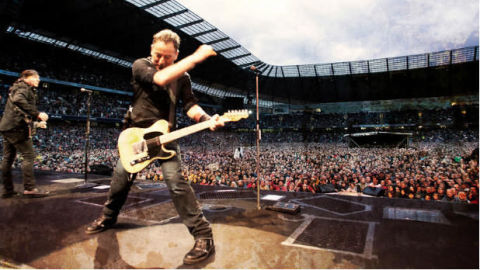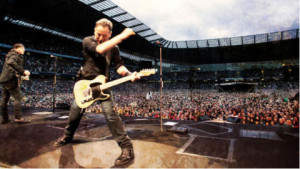If you grew up in the 60s and 70s like I did, you were fortunate to have grown up in the heyday of rock ‘n’ roll. Of course if you grew up in the 80s era of hair bands or the 90s of grunge, you would think those were the days, but of course you would be wrong (I would put a smiley face here, but hopefully sarcasm isn’t lost in the age of emoji). I thought about this when I read a piece about Bruce Springsteen recently closing out the LA Sports Arena with one of its final concerts before the relic (can you believe it’s over 50 years old? Now that’s old!) is torn down to make way for of all things a soccer stadium. (Don’t get me started on that un-American sport that is corrupting America’s youth with boredom and zero-zero ties.) About rock ‘n’ roll the author asks the salient question for we boomer rockers:
But at a moment when new rock music is the least visible it’s ever been — thoroughly overshadowed in the mainstream by pop, country, hip-hop and dance music — is nostalgia the only viable path forward?
Apparently so. Arena rock today is music for the geriatric set. Classic rock the staple of FM music stations around the country. Obviously because my generation refuses to die before it gets old.
If you are one of those, you might remember something referred to as “garage bands” back in the day, as they say. The garage was the minor leagues of future rockers who one day might be “called up to the big show.” It’s where they paid their dues so they could play at “keg parties” to get the word out that they were going to be the next Zeppelin or The Who or Deep Purple or The Doors, and so on and on. Those were heady days for aspiring rockers like me. I’d go to those parties and learn from the lead guitarist how to play all kinds of songs, and dream of the day I’d be playing in arenas in front of multitudes. I grew up in southern California and remember Van Halen playing keg parties before they became Van Halen. I was blown away one day as a freshman in college (1978) when I turned on the radio in my car and heard “Runnin’ with the Devil.” No way! They made it!
Alas, garage bands and keg parties are a thing of the past. There are no more rock bands of inspired youth who will take up the torch and pass the music to the next generation. Garages are just things where cars are parked and junk stored. They no longer inspire dreams and possibilities of arena rock glory. My 14-year-old-obsessed-with-music-son is exhibit A (take a bow, Dominic). He’s been taking piano lessons for several years now. We have an electric, acoustic and recently purchased classical guitar (and no kidding, he’s fired up now about learning Classical Gas, circa 1968!), as well as a keyboard that he got for Christmas that can pretty much make any sound under heaven. But guess what music inspires him. It’s all 40 or so years old! The exception is neo-progressive rock like Spock’s Beard, mainly because my brother was in the band for 15 years, and Neal Morse is a musical genius. But those guys are all old farts now too!
Maybe rock is inherently limiting, all three chords of it, but I don’t buy it. The musical genres mentioned in the Times’ piece quoted above are all just as limited in their raw material. The stories we watch on TV or at the movies take from the same basic narratives we read in the Bible, ancient Greek literature or Shakespeare. There is nothing new under the sun, but there are ways to make fresh what is given to us in creation provided the proper inspiration. Unfortunately it seems garages, arenas and rock are destined to go the way of big bands and swing, crooners and the Rat Pack, or the quintessential extinct species, the dodo bird. One can always dream, but Springsteen, The Rolling Stones and U2 don’t give us much hope.



Larry Kaufmann posted the following comment on Facebook (having problems logging in with Disqus):
I agree, good article Mike, and nice comment Sam. A couple other points…first, forms in music are continuously evolving and often driven by artists’ response to what is currently popular. Rock music emerged in the 1950s as a kind of hybrid of delta blues, country, and jump-blues – the latter a more urban, pop form, which (as Sam suggests) has had a significant but often overlooked influence. Rock went through an extraordinary period of creativity from the mid-50s through the mid-70s and incorporated a host of other influences, not all of which were musical. Prog rock was one of the forms that developed as blues-oriented rock, at its peak popularity in the mid- to late 60s, declined somewhat in the early 70s. Prog was its zenith in the early to mid-70s, but its sometimes baroque extravagance prompted the more primitive, DIY punk response, and the grunginess of punk in short order led to a more mannered and polished post-punk sound (esp. the New Romantics and so-called New Wave, an especially slippery term and category), which lasted until about 1984.
Since then, rock has been recycling and repackaging its own history in successive waves – an argument developed in remarkable depth and complexity in Simon Reynold’s book Retromania (strongly recommended). I believe that’s where we still are today, where rock music remains but often as tribute to its past rather than a vibrant contemporary force. One example: the other day I was shopping at Home Depot, where customers were serenaded by a continual stream of 40 year old hits by the likes of the Doobie Brothers, Steely Dan etc. We’ve become so accustomed to classic rock being the background music of our daily lives that we forget how strange and unusual this is historically. Imagine if hardware stores in 1976 played 1935-era records by Bessie Smith and Duke Ellington for their customers – it would have been alien and bizarre, but now the music from 40 years ago is comforting and non-threatening.
Another important factor impacting music is technology. The rise of MTV in the early 80s had an enormous impact on music – in fact, I think it played a significant role in killing off the more experimental post-punk bands and revitalizing pop, in the soon-to-be dominant figures of Michael Jackson and Madonna. Today, technology has completely transformed how people discover and experience music, especially young people. The reason your kids aren’t discovering the new Van Halen at neighborhood keggers (not necessarily a bad thing, btw) is that they’re downloading music online. This actually promotes musical diversity as the ‘long tails’ of music downloads reveal that a wide variety of music is making its way to listeners, even though this development often flies below the media’s radar since it is diffuse and varied and therefore harder to detect and summarize. In fact, the greater variety and availability of music online may actually be making radio more conservative and pop-oriented, since listeners don’t need to look to radio to discover new sounds. This could be a reprise, of sorts, of MTV’s role in revitalizing pop through new technology.
Not sure if or how this advances the arguments above, but FWIW….
Larry Kaufmann posted the following comment on Facebook (having problems logging in with Disqus):
I agree, good article Mike, and nice comment Sam. A couple other points…first, forms in music are continuously evolving and often driven by artists’ response to what is currently popular. Rock music emerged in the 1950s as a kind of hybrid of delta blues, country, and jump-blues – the latter a more urban, pop form, which (as Sam suggests) has had a significant but often overlooked influence. Rock went through an extraordinary period of creativity from the mid-50s through the mid-70s and incorporated a host of other influences, not all of which were musical. Prog rock was one of the forms that developed as blues-oriented rock, at its peak popularity in the mid- to late 60s, declined somewhat in the early 70s. Prog was its zenith in the early to mid-70s, but its sometimes baroque extravagance prompted the more primitive, DIY punk response, and the grunginess of punk in short order led to a more mannered and polished post-punk sound (esp. the New Romantics and so-called New Wave, an especially slippery term and category), which lasted until about 1984.
Since then, rock has been recycling and repackaging its own history in successive waves – an argument developed in remarkable depth and complexity in Simon Reynold’s book Retromania (strongly recommended). I believe that’s where we still are today, where rock music remains but often as tribute to its past rather than a vibrant contemporary force. One example: the other day I was shopping at Home Depot, where customers were serenaded by a continual stream of 40 year old hits by the likes of the Doobie Brothers, Steely Dan etc. We’ve become so accustomed to classic rock being the background music of our daily lives that we forget how strange and unusual this is historically. Imagine if hardware stores in 1976 played 1935-era records by Bessie Smith and Duke Ellington for their customers – it would have been alien and bizarre, but now the music from 40 years ago is comforting and non-threatening.
Another important factor impacting music is technology. The rise of MTV in the early 80s had an enormous impact on music – in fact, I think it played a significant role in killing off the more experimental post-punk bands and revitalizing pop, in the soon-to-be dominant figures of Michael Jackson and Madonna. Today, technology has completely transformed how people discover and experience music, especially young people. The reason your kids aren’t discovering the new Van Halen at neighborhood keggers (not necessarily a bad thing, btw) is that they’re downloading music online. This actually promotes musical diversity as the ‘long tails’ of music downloads reveal that a wide variety of music is making its way to listeners, even though this development often flies below the media’s radar since it is diffuse and varied and therefore harder to detect and summarize. In fact, the greater variety and availability of music online may actually be making radio more conservative and pop-oriented, since listeners don’t need to look to radio to discover new sounds. This could be a reprise, of sorts, of MTV’s role in revitalizing pop through new technology.
Not sure if or how this advances the arguments above, but FWIW….
Very interesting article, Mike. All of my children largely prefer classic rock/pop over what is produced today, and they are well-educated in the older music, and on back to the music of the 1920s-’40s. I believe that the rise of blues-oriented rock and the decline of pop, which has been a secular trend (in the economic sense) since the mid-1970s, is the proximate cause of rock music’s long-term decline. The excessive simplicity of BOR engenders repetitiveness over the years, and the inability to accommodate significant innovations within the 4/4, 1-4-5 blues rhythm and chord structures makes contemporary practitioners of the rock aesthetic increasingly appear old-hat. Your observation that the forms that have replaced BOR are largely no more melodic than rock is accurate, except in the case of pop, and pop has had a significant recent influence on the other categories.
This, to me, is a positive development. Spock’s Beard and classic rock both benefited greatly from a pop sensibility. The nation’s popular music has been in a long decline since around 1975, and the recent rise of pop is a salutary development. Long live pop; down with rock!